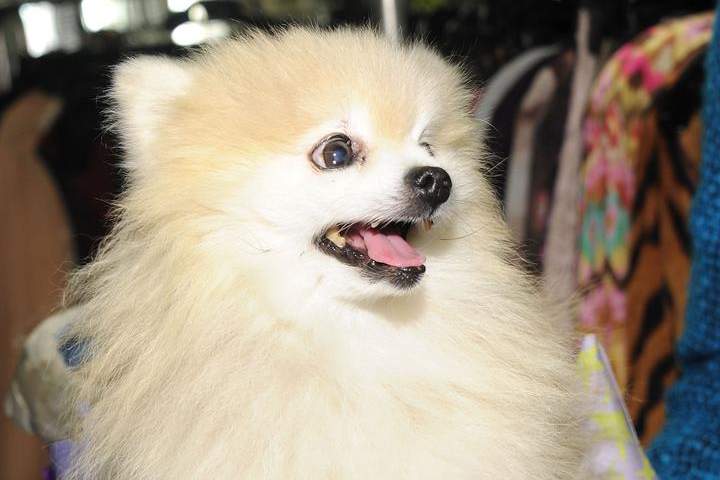LOS ANGELES – Living little carries some big risks.

The smallest dogs in the world weigh less than 7 pounds, and can easily slip through cracks in a fence, get stepped on or even hugged a little too hard.
A few other “little” problems are inherent in the popular “toy” pooches that people love to tote in purses, push in strollers or carry along on errands. They can be expensive if purebred, can’t keep pace with big dogs on long walks, shouldn’t roughhouse with kids and are often targeted by thieves. But pet owners say the small setbacks don’t overshadow the diminutive dogs’ outsized personalities.
“There is vulnerability about small dogs. You have to protect them,” said Debra Beilstein, secretary of the Yorkshire Terrier Club of Los Angeles. Her Yorkie, 13-year-old Mica, weighs 3.8 pounds.
She says their stature doesn’t keep them down.
“Yorkies don’t think of themselves as small,” Beilstein said. “They have big personalities, lots of attitude.”
Many toy dogs have genetic problems with teeth and joints, and they won’t save you money on food costs because they tend to live longer than larger dogs, experts say.
The Chihuahua, Pomeranian, Yorkshire terrier and Maltese are American Kennel Club-designated toy dogs that weigh under 7 pounds.
No one knows exactly how many of these dogs are living in the United States or around the world, but the Yorkshire terrier is the most popular toy breed in the country, ranking No. 6 on this year’s list of all Kennel Club-registered breeds.
Small dogs like Yorkies still require big-time care, American Kennel Club spokeswoman Jessica Rice D’Amato said.

Get breaking National news
“Just because they are small doesn’t mean they need less exercise or mental stimulation than other breeds,” she said.
Do your research, talk to breeders and think about your lifestyle before adopting a toy, she said.
Contrary to some beliefs, “toys are not cheaper to keep than other dogs,” she said. “They live longer, so any savings on food is likely negated by their longer lives.”
And because the small dogs are so adorable, children tend to squeeze them like they do teddy bears, which can cause injuries, Beilstein said.
Her pet Mica is no larger than a bunny, so she watches for predators when they walk and has double-fenced her yard to guard against cracks and crooks.
Perhaps a bigger problem than predators is the tendency of small-statured dogs to tumble from their owners’ arms and get hurt. Dr. Al Townshend, a vet in Chestertown, Maryland, said that’s the most common reason he sees toy dogs.
“People tend to hold them and carry them more frequently. They lose their balance and drop the dog,” Townshend said.
He says falls can lead to serious injuries or death, especially because small dogs have thin skulls.
Another issue is easy for pet owners to control: watching what treats they give to the tiny dogs held close in laps or bags.
“As lap dogs, they tend to have more access to people food, which is not always good for any dog,” said Dr. Jack Stephens, a veterinarian in Boise, Idaho, who has a 2-pound, 13-year-old Chihuahua named Torrey.
It’s hard for them to get down special treats because “typically, toy breeds have misaligned teeth and difficulty chewing,” Stephens added.
Despite the risks and problems of pocket-size pooches, they can give big-time performances.
Pam Shelby, a retired teacher from Beaumont, about 80 miles east of Los Angeles, said her Yorkie, Desi, became a champion in agility contests before passing away four years ago. There’s nothing like taking your dog through the hurdling, jumping, climbing and swerving paces of the obstacle-laden contests, she said.
“If you are doing obedience, rally or agility, you are a team. Desi knew my thoughts and I knew his. There was such a solid connection,” Shelby said.
But the contests have their drawbacks. “It’s addictive” for dogs and owners and can be expensive, she said.
Shelby also expects to face some disappointment as she continues competing because she knows her new dog, year-old Zeke, will never be as good as Desi, who was No. 1 in the country in his agility class from 2001 to 2007.
Those who own toy dogs say they make up for their small stature with a large presence. Stephens, the Idaho vet, says Yorkies have a reputation of being a little cocky, almost too confident, an attribute shared by his pet Chihuahua.
“You will not find a smaller dog than Torrey, nor one more strong-willed in personality, territory or aggressive than her,” he said. “With 10 dogs in our household she ‘rules’ them all by sheer personality.”










Comments